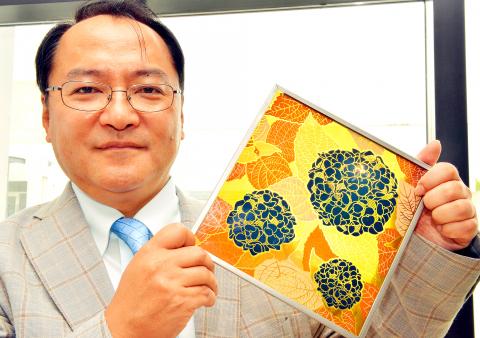A solar cell that resembles a flower offers a new take on “green” energy in Japan, where one scientist is searching for renewables that look good.
In a country badly scarred by the earthquake and tsunami-sparked disaster at the Fukushima Dai-ichi nuclear power plant three years ago, the hydrangea-inspired solar offering might seem insignificant alongside one of the world’s biggest offshore wind power farms now off Japan’s east coast, but Hiroshi Segawa, a professor at the University of Tokyo’s Research Center for Advanced Science and Technology, is hoping his dye-sensitized solar cell, which meshes floral beauty with cutting-edge technology, will brighten the scene.
Segawa’s Annabelle, named after a type of white hydrangea, is made up of flowery stained glass-like solar cells built into a latticed wood box modeled on traditional Japanese doors.

Photo: AFP
While the 20cm-wide box might make a pretty addition to a sunroom, it can also store enough energy to charge your smartphone twice. The leaves generate electricity that is then stored in the flower. As the device charges, the petals turn increasingly blue. However, as Annabelle discharges, those blue petals turn white, just like a real-life hydrangea.
“People do not have a very good image about things related to energy, such as nuclear power,” Segawa told reporters. “Thermal power generation conjures up images of blistering hot dirty coal, while solar panels take up a lot of space. Even wind power generation has problems with bird strikes and noise, but [Annabelle] does not harm the environment.”
While Segawa is not expecting to topple the dominant silicon-based solar panels, he is hoping the fast-growing sector has room for “enjoyable energy” that adds a splash of color to an otherwise drab industry.
Since the disaster in 2011, Japan has been pushing to boost the use of alternative sources of energy.
The country’s solar power generation is rapidly growing, but it still only represents a small share of the overall power mix.
In Japan, the share of power generated from renewable sources, excluding hydropower, lags behind other developed economies at 4.7 percent of the total, far less than 10.4 percent in Britain or the 20.1 percent in Germany, according to data from the International Energy Agency.
Japan’s nuclear plants were shuttered after the 2011 atomic accident — yanking away a power source that once supplied more than one-quarter of the nation’s energy.
Despite Tokyo’s efforts to develop the solar sector, the weather — particularly a lack of reliable sunlight — is among the factors holding back wider use. However, Segawa says Annabelle works even in weak indoor light. It also has a myriad of design possibilities. Segawa has already experimented with a cell that looks like French President Francois Hollande and one resembling the computer-generated Japanese pop star Hatsune Miku.
“You can make solar cells out of animated characters, portraits of real people and lots of other stuff,” he said.

RUN IT BACK: A succesful first project working with hyperscalers to design chips encouraged MediaTek to start a second project, aiming to hit stride in 2028 MediaTek Inc (聯發科), the world’s biggest smartphone chip supplier, yesterday said it is engaging a second hyperscaler to help design artificial intelligence (AI) accelerators used in data centers following a similar project expected to generate revenue streams soon. The first AI accelerator project is to bring in US$1 billion revenue next year and several billion US dollars more in 2027, MediaTek chief executive officer Rick Tsai (蔡力行) told a virtual investor conference yesterday. The second AI accelerator project is expected to contribute to revenue beginning in 2028, Tsai said. MediaTek yesterday raised its revenue forecast for the global AI accelerator used

TEMPORARY TRUCE: China has made concessions to ease rare earth trade controls, among others, while Washington holds fire on a 100% tariff on all Chinese goods China is effectively suspending implementation of additional export controls on rare earth metals and terminating investigations targeting US companies in the semiconductor supply chain, the White House announced. The White House on Saturday issued a fact sheet outlining some details of the trade pact agreed to earlier in the week by US President Donald Trump and Chinese President Xi Jinping (習近平) that aimed to ease tensions between the world’s two largest economies. Under the deal, China is to issue general licenses valid for exports of rare earths, gallium, germanium, antimony and graphite “for the benefit of US end users and their suppliers

Dutch chipmaker Nexperia BV’s China unit yesterday said that it had established sufficient inventories of finished goods and works-in-progress, and that its supply chain remained secure and stable after its parent halted wafer supplies. The Dutch company suspended supplies of wafers to its Chinese assembly plant a week ago, calling it “a direct consequence of the local management’s recent failure to comply with the agreed contractual payment terms,” Reuters reported on Friday last week. Its China unit called Nexperia’s suspension “unilateral” and “extremely irresponsible,” adding that the Dutch parent’s claim about contractual payment was “misleading and highly deceptive,” according to a statement

The Chinese government has issued guidance requiring new data center projects that have received any state funds to only use domestically made artificial intelligence (AI) chips, two sources familiar with the matter told Reuters. In recent weeks, Chinese regulatory authorities have ordered such data centers that are less than 30 percent complete to remove all installed foreign chips, or cancel plans to purchase them, while projects in a more advanced stage would be decided on a case-by-case basis, the sources said. The move could represent one of China’s most aggressive steps yet to eliminate foreign technology from its critical infrastructure amid a